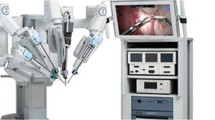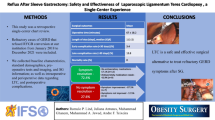Abstract
Background
Robotic technology has recently emerged in different surgical specialties, but the experience with robotic sleeve gastrectomy (RSG) is scarce in the literature. The purpose of this study is to compare our preliminary experience with RSG versus the descriptive results of a systematic review of the laparoscopic approach.
Methods
Data from our RSG experience were retrospectively collected. Two surgeons performed all the cases in one single surgery center. Such information was compared with a systematic review of 22 selected studies that included 3,148 laparoscopic sleeve gastrectomy (LSG) cases. RSG were performed using the daVinci® Surgical System.
Results
This study included 134 RSG vs 3,148 LSG. Mean age and mean BMI was 43 ± 12.6 vs 40.7 ± 11.6 (p = 0.022), and 45 ± 7.1 vs 43.6 ± 8.1 (p = 0.043), respectively. Leaks were found in 0 RSG vs 1.97 % LSG (p = 0.101); strictures in 0 vs 0.43 % (p = 0.447); bleeding in 0.7 vs 1.21 % (p = 0.594); and mortality in 0 vs 0.1 % (p = 0.714), respectively. Mean surgical time was calculated in 106.6 ± 48.8 vs 94.5 ± 39.9 min (p = 0.006); and mean hospital length of stay was 2.2 ± 0.6 vs 3.3 ± 1.7 days (p = <0.005), respectively. Four (2.9 %) complications were found in our robotic series.
Conclusions
Our series shows that RSG is a safe alternative when used in bariatric surgery, showing similar results as the laparoscopic approach. Surgical time is longer in the robotic approach, while hospital length of stay is lower. No leaks or strictures were found in the robotic cases. However, further studies with larger sample size and randomization are warranted.






Similar content being viewed by others
References
Kashyap SR, Gatmaitan P, Brethauer S, et al. Bariatric surgery for type 2 diabetes: weighing the impact for obese patients. Cleve Clin J Med. 2010;77(7):468–76. Review. PMID: 20601620.
Sjöström L, Lindroos AK, Peltonen M, Swedish Obese Subjects Study Scientific Group, et al. Lifestyle, diabetes, and cardiovascular risk factors 10 years after bariatric surgery. N Engl J Med. 2004;351(26):2683–93. PMID: 15616203.
Fischer L, Hildebrandt C, Bruckner T, et al. Excessive weight loss after sleeve gastrectomy: a systematic review. Obes Surg. 2012;22(5):721–31. Review. PMID: 22411568.
Lee WJ, Chong K, Ser KH, et al. Gastric bypass vs sleeve gastrectomy for type 2 diabetes mellitus: a randomized controlled trial. Arch Surg. 2011;146(2):143–8. PMID: 21339423.
Gill RS, Birch DW, Shi X, et al. Sleeve gastrectomy and type 2 diabetes mellitus: a systematic review. Surg Obes Relat Dis. 2010;6(6):707–13. Epub 2010 Aug 6. Review. PMID: 20947447.
Boza C, Gamboa C, Salinas J, et al. Laparoscopic Roux-en-Y gastric bypass versus laparoscopic sleeve gastrectomy: a case–control study and 3 years of follow-up. Surg Obes Relat Dis. 2012;8(3):243–9. Epub 2011 Sep 21. PMID: 22285881.
Finks JF, Kole KL, Yenumula PR, Michigan Bariatric Surgery Collaborative, from the Center for Healthcare Outcomes and Policy, et al. Predicting risk for serious complications with bariatric surgery: results from the Michigan Bariatric Surgery Collaborative. Ann Surg. 2011;254(4):633–40. PMID: 21897200.
Márquez MF, Ayza MF, Lozano RB, et al. Gastric leak after laparoscopic sleeve gastrectomy. Obes Surg. 2010;20(9):1306–11. Review. PMID: 20574787.
Gill RS, Switzer N, Driedger M, et al. Laparoscopic sleeve gastrectomy with staple line buttress reinforcement in 116 consecutive morbidly obese patients. Obes Surg. 2012;22(4):560–4. PMID: 22258197.
Prasad P, Tantia O, Patle N, et al. An analysis of 1-3-year follow-up results of laparoscopic sleeve gastrectomy: an Indian perspective. Obes Surg. 2012;22(3):507–14. PMID: 22246395.
Chopra A, Chao E, Etkin Y, et al. Laparoscopic sleeve gastrectomy for obesity: can it be considered a definitive procedure? Surg Endosc. 2012;26(3):831–7. Epub 2011 Dec 17. PMID: 22179438.
Albanopoulos K, Alevizos L, Flessas J, et al. Reinforcing the staple line during laparoscopic sleeve gastrectomy: prospective randomized clinical study comparing two different techniques. Preliminary results. Obes Surg. 2012;22(1):42–6. PMID: 21533880.
Lee SY, Lim CH, Pasupathy S, et al. Laparoscopic sleeve gastrectomy: a novel procedure for weight loss. Singap Med J. 2011;52(11):794–800. PMID: 22173248.
D´Hondt M, Vanneste S, Pottel H, et al. Laparoscopic sleeve gastrectomy as a single-stage procedure for the treatment of morbid obesity and the resulting quality of life, resolution of comorbidities, food tolerance, and 6-year weight loss. Surg Endosc. 2011;25(8):2498–504. Epub 2011 Feb 27. PMID: 21359900.
Bellanger DE, Greenway FL. Laparoscopic sleeve gastrectomy, 529 cases without a leak: short-term results and technical considerations. Obes Surg. 2011;21(2):146–50. PMID: 21132397.
Stamou KM, Menenakos E, Gomatos IP, et al. Clinical implications of sleeve gastrectomy as a source of spleen infarction or ischemia. Obes Surg. 2011;21(10):1490–3. doi:10.1007/s11695-010-0302-0. PMID: 21086063.
Leyba JL, Aulestia SN, Llopis SN. Laparoscopic Roux-en-Y gastric bypass versus laparoscopic sleeve gastrectomy for the treatment of morbid obesity. A prospective study of 117 patients. Obes Surg. 2011;21(2):212–6.
Arroyo K, Alkhoury F, Nadzam G, et al. Magenstrasse and Mill gastroplasty and sleeve gastrectomy as treatment for morbid obesity. Conn Med. 2010;74(10):589–93. Erratum in: Conn Med. 2011 Sep;75(8):512. Alkoury, Fuad [corrected to Alkhoury Faud]. PMID: 21189715.
Lacy A, Ibarzabal A, Pando E, et al. Revisional surgery after sleeve gastrectomy. Surg Laparosc Endosc Percutan Technol. 2010;20(5):351–6. Erratum in: Surg Laparosc Endosc Percutan Tech. 2010 Dec; 20(6):428. Obarzabal, Ainitze [corrected to Ibarzabal, Ainitze]. PMID: 20975509.
Rice RD, Simon TE, Seery JM, et al. Laparoscopic sleeve gastrectomy: outcomes at a military training center. Am Surg. 2010;76(8):835–40. PMID: 20726413.
Csendes A, Braghetto I, León P, et al. Management of leaks after laparoscopic sleeve gastrectomy in patients with obesity. J Gastrointest Surg. 2010;14(9):1343–8. Epub 2010 Jun 22. PMID: 20567930.
Ser KH, Lee WJ, Lee YC, et al. Experience in laparoscopic sleeve gastrectomy for morbidly obese Taiwanese: staple-line reinforcement is important for preventing leakage. Surg Endosc. 2010;24(9):2253–9. Epub 2010 Feb 21. PMID: 20174931.
Armstrong J, O´Malley SP. Outcomes of sleeve gastrectomy for morbid obesity: a safe and effective procedure? Int J Surg. 2010;8(1):69–71. Epub 2009 Nov 21. PMID: 19944193.
Burgos AM, Braguetto I, Csendes A, et al. Gastric leak after laparoscopic-sleeve gastrectomy for obesity. Obes Surg. 2009;19(12):1672–7. Epub. PMID: 19506979.
Arias E, Martinez PR, Ka Ming Li V, et al. Mid-term follow-up after sleeve gastrectomy as a final approach for morbid obesity. Obes Surg. 2009;19(5):544–8. Epub 2009 Mar 12. PMID: 19280267.
Uglioni B, Wölnerhanssen B, Peters T, et al. Midterm results of primary vs. secondary laparoscopic sleeve gastrectomy (LSG) as an isolated operation. Obes Surg. 2009;19(4):401–6. Epub 2009 Jan 24. PMID: 19169763.
Kasalicky M, Michalsky D, Housova J, et al. Laparoscopic sleeve gastrectomy without an over-sewing of the staple line. Obes Surg. 2008;18(10):1257–62. Epub 2008 Jul 23. PMID: 18649114.
Mui WL, Ng EK, Tsung BY, et al. Laparoscopic sleeve gastrectomy in ethnic obese Chinese. Obes Surg. 2008;18(12):1571–4. Epub 2008 May 28. PMID: 18506552.
Skrekas G, Lapatsanis D, Stafyla V, et al. One year after laparoscopic "tight" sleeve gastrectomy: technique and outcome. Obes Surg. 2008;18(7):810–3. Epub 2008 Apr 8. PMID: 18392901.
Himpens J, Dapri G, Cadière GB. A prospective randomized study between laparoscopic gastric banding and laparoscopic isolated sleeve gastrectomy: results after 1 and 3 years. Obes Surg. 2006;16(11):1450–6. PMID: 17132410.
Rudmin JW. Calculating the exact pooled variance. Physics. 2010;arXiv:1007–12.
Diamantis T, Alexandrou A, Nikiteas N, et al. Initial experience with robotic sleeve gastrectomy for morbid obesity. Obes Surg. 2011;21(8):1172–9. PMID: 20686929.
Ayloo S, Buchs NC, Addeo P, et al. Robot- assisted sleeve gastrectomy for super-morbidly obese patients. J Laparoendosc Adv Surg Tech A. 2011;21(4):295–9. Epub 2011 Mar 28. PMID: 21443432.
Abdalla RZ, Garcia RB, Luca CR, et al. Brazilian experience in obesity surgery robot-assisted. Arq Bras Cir Dig. 2012;25(1):33–5. English, Portuguese. PMID: 22569976.
Elli EF, Masrur MA, Giulianotti PC. Robotic sleeve gastrectomy after liver transplantation. Surg Obes Relat Dis. 2013;9(1):e20–2. doi:10.1016/j.soard.2012.01.010. Epub 2012 jan 21. PMID: 22365186.
Vilallonga R, Fort JM, Gonzalez O, et al. The initial learning curve for robot-assisted sleevegastrectomy: a surgeon’s experience while introducing the robotic technology in a bariatric surgery department. Minim Invasive Surg. 2012;2012:347131. doi:10.1155/2012/347131. Epub 2012 Sep 17. PMID: 23029610.
Romero RJ, Kosanovic R, Rabaza J, et al. Robotic sleeve gastrectomy: experience of 134 cases and comparison with a systematic review of the laparoscopic approach. Obes Surg. 2013. doi:10.1007/s11695-013-1004-1.
Sakran N, Goitein D, Raziel A, et al. Gastric leaks after sleeve gastrectomy: a multicenter experience with 2,834 patients. Surg Endosc. 2013;27(1):240–5. doi:10.1007/s00464-012-2426-x. Epub 2012 Jun 30. PMID: 22752283.
Aurora AR, Khaitan L, Saber AA. Sleeve gastrectomy and the risk of leak: a systematic analysis of 4,888 patients. Surg Endosc. 2012;26(6):1509–15. Epub 2011 Dec 17. Review. PMID: 22179470.
Varela JE. Laparoscopic sleeve gastrectomy versus laparoscopic adjustable gastric banding for the treatment severe obesity in high risk patients. JSLS. 2011;15(4):486–91. PMID: 22643503.
Boza C, Salinas J, Salgado N, et al. Laparoscopic sleeve gastrectomy as a stand-alone procedure for morbid obesity: report of 1,000 cases and 3-year follow-up. Obes Surg. 2012;22(6):866–71. PMID: 22438219.
van der Schatte Olivier RH, Van´t Hullennar CD, Ruurda JP, et al. Ergonomics, user comfort, and performance in standard and robot-assisted laparoscopic surgery. Surg Endosc. 2009;23(6):1365–71. Epub 2008 Oct 15. PMID: 18855053.
Heemskerk J, van Gemert WG, de Vries J, et al. Learning curves of robot-assisted laparoscopic surgery compared with conventional laparoscopic surgery: an experimental study evaluating skill acquisition of robot-assisted laparoscopic tasks compared with conventional laparoscopic tasks in inexperienced users. Surg Laparosc Endosc Percutan Tech. 2007;17(3):171–4. PMID: 17581459.
Acknowledgments
The authors thank Ignacio Danta (Clinical Research Coordinator), Julie Lamoureux (Statistician), and Tanya Judkins-Cohn (Research Specialist).
Conflict of Interest
Jorge Rabaza declares as a unique conflict of interest payment for lectures for Intuitive Surgical Inc. Anthony M. Gonzalez declares as a unique conflict of interest payment for lectures and development of educational presentations for Intuitive Surgical Inc. The rest of the authors declare no conflict of interest, which may arise from being named as authors on the manuscript.
Author information
Authors and Affiliations
Corresponding author
Rights and permissions
About this article
Cite this article
Romero, R.J., Kosanovic, R., Rabaza, J.R. et al. Robotic Sleeve Gastrectomy: Experience of 134 Cases and Comparison with a Systematic Review of the Laparoscopic Approach. OBES SURG 23, 1743–1752 (2013). https://doi.org/10.1007/s11695-013-1004-1
Published:
Issue Date:
DOI: https://doi.org/10.1007/s11695-013-1004-1




